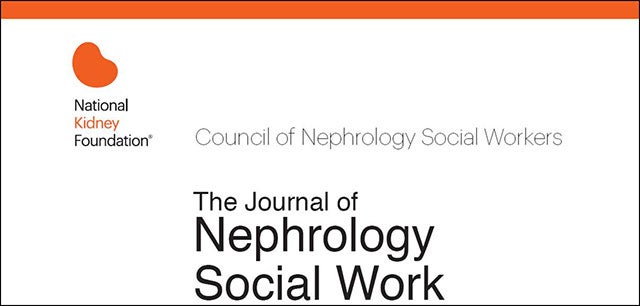The Journal Of Nephrology Social Work - Volume 45, Issue 1 (2021)

Table of Contents
Assessment of Health-related Quality of Life in Hmong Dialysis Patients at Mayo Clinic Health System Northwest Wisconsin
Jessica Zeman, APSW, NSW-C, Abdul Khan, MD, MBBS, Mayo Clinic Health System Department of Nephrology, Eau Claire, WI
A chronic illness, such as kidney disease, has a significant effect on an individual’s perception of their quality of life (QOL). Health-related quality of life (HRQOL) is the subjective perception of an illness and treatment on the physical, psychological, and social well-being of that individual. In this study, we reviewed HRQOL in the Hmong-American (n = 22) and Non-Hmong-American (n = 40) patients receiving dialysis treatments at Mayo Clinic Health System Northwest Wisconsin (MCHS NWWI) utilizing the Kidney Disease Quality of Life-36 (KDQOL-36TM) survey. Our findings indicate a discrepancy between Hmong-American and Non-Hmong-American patients in the Burden of Kidney Disease subscale score of this survey. Language barriers, traditional belief systems versus Western medical practices, lack of understanding regarding illnesses, and a cultural focus on the family as a whole instead of individuality may have a significant bearing on the differences found between Hmong-American and Non-Hmong-American patients.
The State of Patient-Centered Outcomes Research in Chronic Kidney Disease: Perspectives from Patients, Care Partners, and Researchers
Samuel R. Bethel, MSW, LCSW, PhD(c), Teri Browne, MSW, PhD, College of Social Work, University of South Carolina, Columbia, SC; Derek Forfang, Jessica Joseph, MBA, Kelli Collins Damron, MSW, National Kidney Foundation, New York, NY; Laura Brereton, The Wilson Centre, Toronto General Hospital, Toronto, Ontario, Canada
Patient-centered outcomes research (PCOR) requires that patients and care partners be active partners throughout the entire research process. Although PCOR methodologies in health research have increased, PCOR on chronic kidney disease (CKD) remains relatively low. This project aimed to better understand the state of PCOR on CKD from the perspectives of patients, care partners, and researchers. Two National Kidney Foundation (NKF) surveys were completed by 847 CKD patients and care partners and 647 CKD researchers. Results indicate that a small minority (7%) of patient and care partner respondents were involved with kidney disease research, and less than a third (27%) of responding researchers indicated that they had involved patients and care partners in their research projects within the last five years. Despite relatively low numbers of PCOR projects on CKD, patients and care partner respondents are eager to participate in research and, likewise, CKD researchers are interested in doing PCOR. Implications include increasing PCOR on CKD and utilizing nephrology social workers to facilitate connections among CKD patients, care partners, and researchers.
Practice Note: The Importance of Kidney Disease Peer Mentor Programs During the COVID-19 Pandemic
Kristy Washinger, MSN, FNP-BC, Nephrology Associates of Central PA, Camp Hill, PA;
Robin Asick, MSW, LSW, NSW-C, University of New England, Maine;
Lynne Wright, MSW, LSW, Kidney Foundation of Central Pennsylvania, Harrisburg, PA
National Kidney Foundation
NKF 2021 Spring Clinical Meetings Abstracts
April 6–10, 2021
